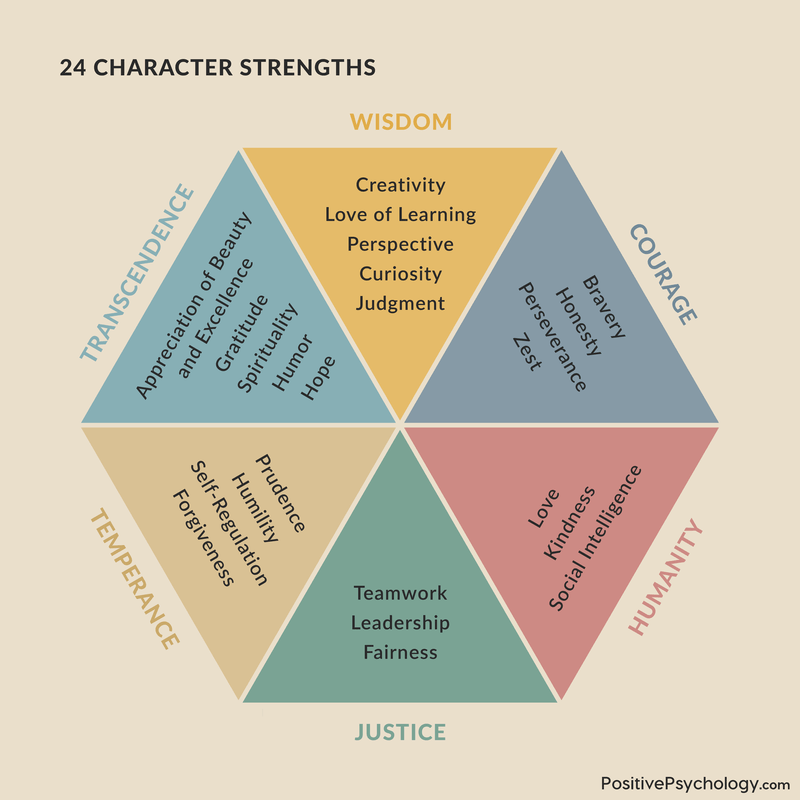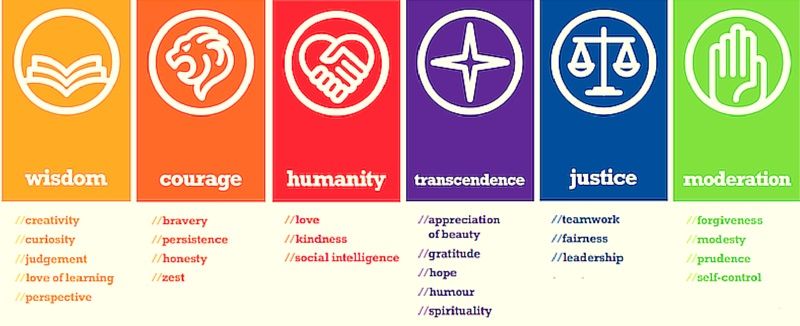The Classification of Character Strengths and Virtues
 Character Strengths and Virtues is a groundbreaking handbook compiling the work of researchers to create a classification system for widely valued positive traits.
Character Strengths and Virtues is a groundbreaking handbook compiling the work of researchers to create a classification system for widely valued positive traits.
This handbook also intends to provide an empirical theoretical framework that will assist positive psychology practitioners in developing practical applications for the field.
There are 6 classes of virtues that are made up of 24 character strengths:
- Wisdom and Knowledge
- Courage
- Humanity
- Justice
- Temperance
- Transcendence
Researchers approached the measurement of “good character” based on the strengths of authenticity, persistence, kindness, gratitude, hope, humor, and more.
Before you continue, we thought you might like to download our three Strengths Exercises for free. These detailed, science-based exercises will help you or your clients realize your unique potential and create a life that feels energized and authentic.
This Article Contains:
- What Makes Us Strong and Virtuous?
- The CSV Handbook’s List
- Positive Psychology & Character Strengths and Virtues
- What Strengths do Women Score Higher?
- What Strengths do Men Score Higher?
- What Can We Learn From Both
- Development of Character Strengths in Children
- Character Strengths and Wellbeing in Adolescence
- Videos on Character Strengths
- A Take-Home Message
- References
What Makes Us Strong and Virtuous?
Cultures around the world have valued the study of human strength and virtue. Psychologists have a particular interest in it as they work to encourage individuals to develop these traits. While all cultures value human virtues, different cultures express or act on virtues in different ways based on differing societal values and norms.
Martin Seligman and his colleagues studied all major religions and philosophical traditions and found that the same six virtues (i.e. courage, humanity, justice, etc.) were shared in virtually all cultures across three millennia.
Since these virtues are considered too abstract to be studied scientifically, positive psychology practitioners focused their attention on the strengths of character created by virtues, and created tools for their measurement.
The main assessment instruments they used to measure those strengths were:
- Structured interviews
- Questionnaires
- Informant Reports
- Behavioral Experiments
- Observations
The main criteria for characters strengths that they came up with are that each trait should:
- Be stable across time and situations
- Be valued in its own right, even in the absence of other benefits
- Be recognized and valued in almost every culture, be considered non-controversial and independent of politics.
- Cultures provide role models that possess the trait so other people can recognize its worth.
- Parents aim to instil the trait or value in their children.
The CSV Handbook’s List
The Handbook delves into each of these six traits. We’ve summarized key points here.
1. Virtue of Wisdom and Knowledge
The more curious and creative we allow ourselves to become, the more we gain perspective and wisdom and will, in turn, love what we are learning. This is developing the virtue of wisdom and knowledge.
Strengths that accompany this virtue involve acquiring and using knowledge:
- Creativity (e.g. Albert Einstein’s creativity led him to acquire knowledge and wisdom about the universe)
- Curiosity
- Open-mindedness
- Love of Learning
- Perspective and Wisdom (Fun fact: many studies have found that adults’ self-ratings of perspective and wisdom do not depend on age, which contrasts the popular idea that our wisdom increases with age).
2. Virtue of Courage
The braver and more persistent we become, the more our integrity will increase because we will reach a state of feeling vital, and this results in being more courageous in character.
Strengths that accompany this virtue involve accomplishing goals in the face of things that oppose it:
- Bravery
- Persistence
- Integrity
- Vitality
3. Virtue of Humanity
There is a reason why Oprah Winfrey is seen as a symbol of virtue for humanitarians: on every show, she approaches her guests with respect, appreciation, and interest (social intelligence), she practices kindness through her charity work, and she shows her love to her friends and family.
Strengths that accompany this virtue include caring and befriending others:
- Love
- Kindness
- Social intelligence
4. Virtue of Justice
Mahatma Gandhi was the leader of the Indian independence movement in British-ruled India. He led India to independence and helped created movements for civil rights and freedom by being an active citizen in nonviolent disobedience. His work has been applied worldwide for its universality.
Strengths that accompany this virtue include those that build a healthy and stable community:
- Being an active citizen who is socially responsible, loyal, and a team member.
- Fairness
- Leadership
5. Virtue of Temperance
Being forgiving, merciful, humble, prudent, and in control of our behaviors and instincts prevents us from being arrogant, selfish, or any other trait that is excessive or unbalanced.
Strengths that are included in this virtue are those that protect against excess:
- Forgiveness and mercy
- Humility and modesty
- Prudence
- Self-Regulation and Self-control
6. Virtue of Transcendence
The Dalai Lama is a transcendent being who speaks openly why he never loses hope in humanity’s potential. He also appreciates nature in its perfection and lives according to what he believes is his intended purpose.
Strengths that accompany this virtue include those that forge connections to the larger universe and provide meaning:
- Appreciation of beauty and excellence
- Gratitude
- Hope
- Humor and playfulness
- Spirituality, or a sense of purpose
Positive Psychology & Character Strengths and Virtues
Positive psychology practitioners can count on practical applications to help individuals and organizations identify their strengths and use them to increase and maintain their levels of wellbeing.
They also emphasize that these character strengths exist on a continuum; positive traits are regarded as individual differences that exist in degrees rather than all-or-nothing categories.
In fact, the handbook has an internal subtitle entitled “A Manual of the Sanities” because it is intended to do for psychological wellbeing what the DSM does for psychological disorders: to add systematic knowledge and ways to master new skills and topics.
Research shows that these human strengths can act as buffers against mental illness. For instance, being optimistic prevents one’s chances of becoming depressed. The absence of particular strengths may be an indication of psychopathology. Positive psychology therapists, counselors, coaches, and other psychological professions use these new methods and techniques to help build people’s strength and broaden their lives.
It should be noted that many researchers are advocating grouping these 24 traits into just four classes of strength (Intellectual, Social, Temperance, and Transcendence) or even three classes (excluding transcendence), as evidence has shown that these classes do an adequate job of capturing all 24 original traits.
Others caution that people occasionally use these traits to excess, which can become a liability to the person. For example, some people may use humor as a defense mechanism in order to avoid dealing with a tragedy.
Character strengths are the positive parts of our personality that make us feel authentic and engaged. They are a core and foundational part of who we are. Our strengths are linked to our development, wellbeing, and life satisfaction (Niemiec, 2013).
They influence how we think, act, feel, and represent what we value in ourselves and others. When we draw on our strengths, research shows we can have a more influential positive impact on others, improve our relationships, and enhance our wellbeing and happiness.
So, where can we begin? By recognizing our strengths, of course!
The VIA Survey is one validated tool that can help us discover our strengths, including those we tend to use and rely on the most (Peterson & Seligman, 2004).
Scientists found a common language of 24 character strengths that make up what is best about our personality. Everyone possesses all 24 character strengths to different degrees, so each person has a truly unique character strengths profile.
Each character strength falls under one of these six broad virtue categories, which are universal across cultures and nations:
- Wisdom: These strengths are useful in helping us learn and gather knowledge.
- Courage: These emotional strengths empower us to tackle adversity and how we tend to work through it.
- Humanity: These strengths come into play by helping us build and maintain positive, warm relationships with others.
- Justice: With these strengths, we relate to those around us in social or group situations.
- Temperance: Temperance strengths help us manage habits and protect against excess, including managing and overcoming vices.
- Transcendence: As a virtue, transcendence strengths connect us to the world around us in a meaningful way.
Knowing our strengths allows us to consciously use those that benefit us and develop those that we might find useful.

What Strengths Do Women Score Higher?
There’s an interest in identifying dominant character strengths in genders and how it is developed.
As Martin Seligman and his colleagues studied all major religions and philosophical traditions to find universal virtues, much of the research on gender and character strengths have been cross-cultural also.
In a study by Brdar, Anic, & Rijavec on gender differences and character strengths, women scored highest on the strengths of honesty, kindness, love, gratitude, and fairness.
Life satisfaction for women was predicted by zest, gratitude, hope, appreciation of beauty/excellence, and love for other women. A recent study by Mann showed that women tend to score higher on gratitude than men. Alex Linley and colleagues reported in a UK study that women not only scored higher in interpersonal strengths, such as love and kindness, but on social intelligence, too.
In a cross-cultural study in Spain by Ovejero and Cardenal, they found that femininity was positively correlated with love, social intelligence, appreciation of beauty, love of learning, forgiveness, spirituality, and creativity. The more masculine a man was, the more he correlated negatively with these character strengths.
What Strengths Do Men Score Higher?
Brdar, Anic & Rijavac reported that men score highest on honesty, hope, humor, gratitude, and curiosity.
Their life satisfaction was predicted by creativity, perspective, fairness, and humor. Alex Linley and colleagues study showed that men scored higher than females on creativity.
Miljković and Rijavec’s study found sex differences in a sample of college students. Men not only scored higher in creativity, but also leadership, self-control, and zest. These findings are congruent with gender stereotypes, as the study by Ovejero and Cardenal in Spain showed that men did not equate typical masculine strengths with love, forgiveness, love of learning, and so on.
In a Croatian sample, Brdar and colleagues found that men viewed cognitive strengths as a greater predictor for life satisfaction. Men saw strengths such as teamwork, kindness, perspective, and courage to be a stronger connection to life satisfaction than other strengths. There is an important limitation to this sample population, as most of the participants were women.
What Can We Learn From Both?
While there are differences in character strengths between men and women, there are many that they share. Both genders saw gratitude, hope, and zest as being related to higher life satisfaction, as well as the tendency to live in accordance with the strengths that are valued in their particular culture.
Studies confirm that there is a duality between genders, but only when both genders identify strongly with gender stereotypes. It makes one wonder if men and women are inherently born with certain strengths, or if the cultural influence of certain traits prioritizes different traits based on gender norms.
Learn more about strengths and weaknesses tests here.
Development of Character Strengths in Children

Park and Peterson’s study (2006) confirmed this theoretical speculation, concluding that these sophisticated character strengths usually require a degree of cognitive maturation that develops during adolescence. So although gratitude is associated with happiness in adolescents and adulthood, this is not the case in young children.
Park and Peterson’s study found that the association of gratitude with happiness starts at age seven.
“Gratitude is seen as a human strength that enhances one’s personal and relational wellbeing and is beneficial for society as a whole.”
Simmel
Although most young children are not yet cognitively mature enough for sophisticated character strengths, there are many fundamental character strengths that are developed at a very early stage.
The strengths of love, zest, and hope are associated with happiness starting at a very young age. The strengths of love and hope are dependent on the infant and caregiver relationship. A secure attachment to the caregiver at infancy is more likely to result in psychological and social well adjustment throughout their lives.
The nurturing of a child plays a significant role in their development, and role modeling is an important way of teaching a child certain character strengths as they imitate behavior and can then embrace the strength as one of their own.
Most young children don’t have the cognitive maturity to display gratitude but have the ability to display love and hope. Therefore, gratitude must not be expected from a young child but must be taught.
Positive education programs have been developed to help children and adolescents focus on character strengths. There are certain character strengths in adolescents that have a clearer impact on psychological wellbeing. These strengths must be fostered to ensure life long fulfillment and satisfaction.
“Character strengths are influenced by family, community, societal, and other contextual factors. At least in theory, character strengths are malleable; they can be taught and acquired through practice.”
Gillham, et al.
Character Strengths and Wellbeing in Adolescents
The majority of the research today on character strengths focuses on adults, despite the known importance of childhood and adolescence on character development.
Research into character strengths shows which promote positive development and prevent psychopathology.
Dahlsgaard, Park, and Peterson discovered that adolescents with higher levels of zest, hope, and leadership displayed lower levels of anxiety and depression in comparison to their peers with lower levels of these strengths. Other research findings suggested that adolescent character strengths contribute to wellbeing (Gillham, et al, 2011).
The research suggests that transcendence (eg. gratitude, meaning, and hope) predicts life satisfaction, demonstrating the importance of adolescents developing positive relationships, creating dreams, and finding a sense of purpose.
VIA Character Strengths Youth Survey
Parents, educators, and researchers have requested the VIA: institute on character strengths to develop a VIA survey that is especially aimed at youths. Take the VIA psychometric data – youth survey if you are between the ages of 10-17.
Videos on Character Strengths
To finish off, here are some helpful videos for you to enjoy if you want to learn more about character strengths and virtues:
A Take-Home Message
The measurement of character strengths and the different traits that go into making them have many applications, from life satisfaction to happiness and other wellbeing predictors. These measurement tools have been used to study how these strengths have been developed across genders and age groups.
What strengths do you possess? What implications can you see this research having in our world today? Can you see how it may apply to your own life?
Please share your thoughts in the comment section below.
We hope you enjoyed reading this article. Don’t forget to download our three Strengths Exercises for free.
- Bowlby, J.(1969). Attachment and Loss, (Vol. I). Attachment . Basic Books, New York.
- Dahlsgaard, K.K. (2005). Is virtue more than its own reward? Character strengths and their relation to well-being in a prospective, longitudinal study of middle school-aged adolescents (Unpublished doctoral dissertation). University of Pennsylvania, Philadelphia,PA.
- Gillham, J., Adams-Deutsch, Z., Werner, J., Reivich, K., Coulter-Heindl, V., Linkins, M., Seligman, M. (2011). Character strengths predict subjective well-being during adolescence. The Journal of Positive Psychology, 6(1), 31-44.
- Jolly, M., & Academia. (2006). Positive Psychology: The Science of Human Strengths. Retrieved from https://www.academia.edu/6442081/Positive_Psychology_The_Science_of_Human_Strengths
- Kochanska, G. (2001). Emotional development in children with different attachment histories: The first three years. Developmental Psychology 72, pp. 474–490.
- McCullough, M. E., Kilpatrick, S. D., Emmons, R. A., & Larson, D. B. (2001). Is gratitude a moral affect? Psychological Bulletin, 127, 249−266.
- Niemiec, R. M. (2013). Mindfulness and character strengths. Hogrefe Publishing.
- Park, N., & Peterson, C. (2006, a). Character strengths and happiness among young children: Content analysis of parental descriptions. Journal of Happiness Studies, 7(3), 323-341.
- Park, N., & Peterson, C. (2006, b). Moral competence and character strengths among adolescents: The development and validation of the Values in Action Inventory of Strengths for Youth. Journal of adolescence, 29(6), 891-909.
- Peterson, C., & Seligman, M. (2004). Character strengths and virtues a handbook and classification.
- Washington, DC: American Psychological Association. Simmel, G. (1950). The sociology of Georg Simmel. Glencoe, IL: Free Press.
- Tartakovsky, M. (2011). Measuring Your Character Strengths | World of Psychology. Retrieved from http://psychcentral.com/blog/archives/2011/01/05/measuring-your-character-strengths/
Let us know your thoughts
Read other articles by their category
- Body & Brain (49)
- Coaching & Application (57)
- Compassion (26)
- Counseling (51)
- Emotional Intelligence (24)
- Gratitude (18)
- Grief & Bereavement (21)
- Happiness & SWB (40)
- Meaning & Values (26)
- Meditation (20)
- Mindfulness (45)
- Motivation & Goals (45)
- Optimism & Mindset (34)
- Positive CBT (28)
- Positive Communication (20)
- Positive Education (47)
- Positive Emotions (32)
- Positive Leadership (18)
- Positive Parenting (4)
- Positive Psychology (33)
- Positive Workplace (37)
- Productivity (16)
- Relationships (46)
- Resilience & Coping (36)
- Self Awareness (21)
- Self Esteem (38)
- Strengths & Virtues (31)
- Stress & Burnout Prevention (34)
- Theory & Books (46)
- Therapy Exercises (37)
- Types of Therapy (64)





What our readers think
Very interesting article – and I love that children are learning this information now. Hoping that while they learn more about their own strengths and weaknesses, they will not only develop their own character but be understanding and accepting of others as well.
Very useful article, i know only basic English. But your sentences are easily understandable. This way i can improve my English skills. Thank you all.